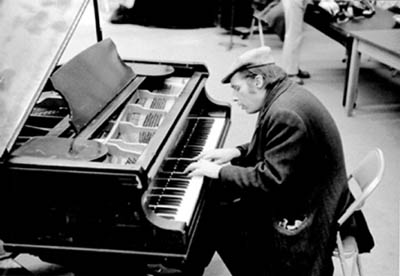With the first note he is transformed, now more angel than gargoyle. He sways rhythmically, humming, closing his eyes in ecstasy, a free hand molding a musical sculpture in the air.
Chords and arpeggios fly effortlessly from his fingers, notes ripple like pearls and inner voices are revealed.
Glenn Gould played with the same mystical communion whether he was alone at home or, as he was that day in May 1957, on the stage of the Moscow Conservatory. A few curious onlookers had come to hear him, for he was the very first Western musician to be invited to Soviet Russia. At the intermission, the delirious listeners put out the word like drums in the street. When Gould returned to the stage, the hall was jammed.
A young Sviatoslav Richter, considered by many the greatest living pianist, watched in awe. "I could play Bach that well," Richter later said to a friend, "but I would have to practice very hard. That is the genius of Glenn Gould." Composer Dimitry Tolstoy declared that "Gould was an alien on this Earth. People simply cannot play the piano like that!"
Gould's effect on some of the young women who saw him was intoxicating. One addressed him as "Dear beloved incomparable, charming maestro from the enchanting world of fairy tales. Our poet of the piano." In his playing, his championing of Bach and modern composers, and in his display of individualism, Gould inspired a new era in the freedom of expression in the Soviet Union and changed the musical climate throughout the world.

|
| Gould was one of the most brilliant and complex musicians of the 20th century. Shown here in rehearsal, 1974 (photo by Walter Curtin, 1974/ courtesy NAC/PA-137052). |
Gould was not from a world of fairy tales. He was born in Toronto in 1932. His mother Flora was a pianist and singer and she was determined to nurture her son's talent. She taught him to read music even before words. His gifts were obvious: perfect pitch, miraculous finger dexterity and an uncanny ability to read and memorize music on sight. Whether it was a result of his mother's overprotection or the nature of his genius itself, Glenn also displayed an extreme need to avoid social contact. "Isolation is the indispensable component of human happiness," he said. At age 19 Gould dropped out of school and worked painstakingly on his Bach interpretations in seclusion at the family cottage at Lake Simcoe.
On January 2, 1955 Gould made his American debut in Washington at age 20. The esteemed critic Paul Hume reported that "Glenn Gould is a pianist of rare gifts for the world... We know of no pianist anything like him of any age." After only one "otherworldly" concert in New York, Columbia Records signed him to a contract. They were deeply skeptical when he chose Bach's Goldberg Variations as his debut album. At that time the work was considered obscure and unplayable. Gould's joyous recording catapulted him to worldwide fame.
Despite the profound effect that Gould had on his audiences, he abhorred concerts. Their strain, as well as his poor diet and abuse of prescription drugs took a toll on his health. He quit the concert stage in 1964, famously the first great musician to devote himself strictly to recording.
By his mid-40s Gould's appearance had changed from the radiant young man who had broken hearts in Russia. He looked haggard and aged. Since his premature death, on October 4, 1982, age 50, his genius, recordings, writings, philosophy, psychology and even pharmacology have been the source of endless speculation.
Gould had a profound effect on all who heard him, not just his playing but his person. Musicologist Vladimir Tchinaev described what separated Gould from all other pianists. It is "that he is a loner. He is by himself. And in this he finds an army of admirers, outsiders as well, for whom the world around them is not as important as the state of the soul." He was, as he himself described Sebastian Bach, "an example of a man who makes richer his own time by not being in it."

 Share on Facebook
Share on Facebook Share on X
Share on X Share by Email
Share by Email Share on Google Classroom
Share on Google Classroom
